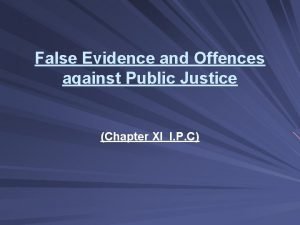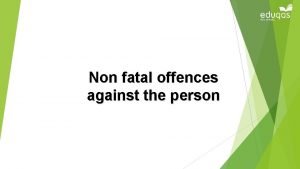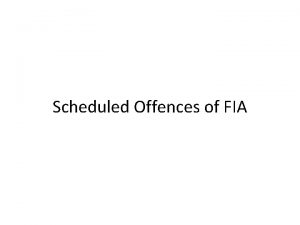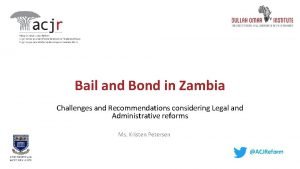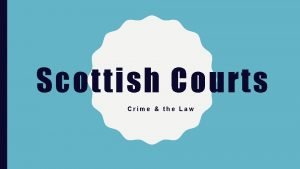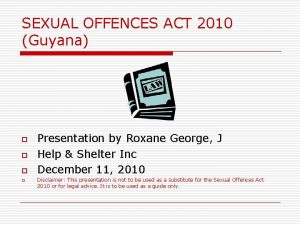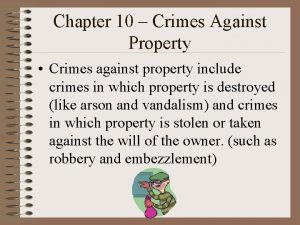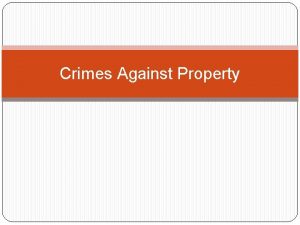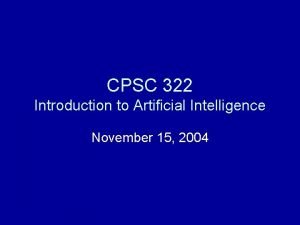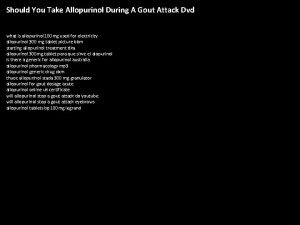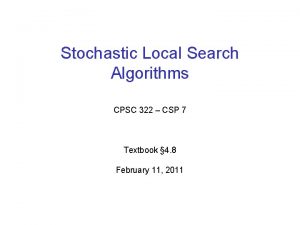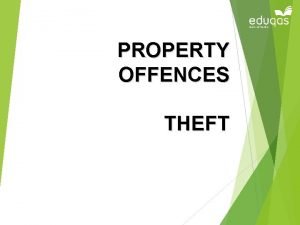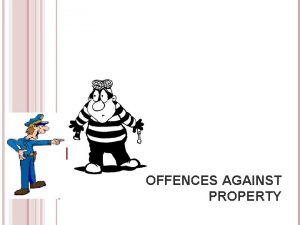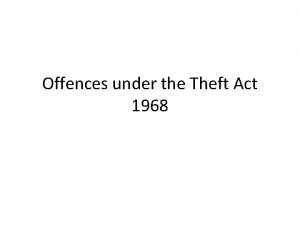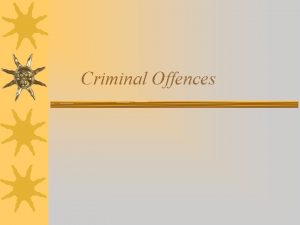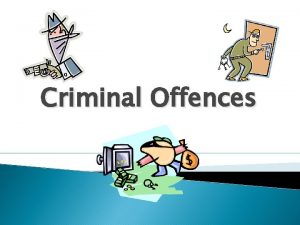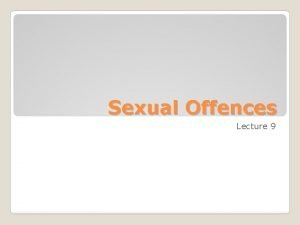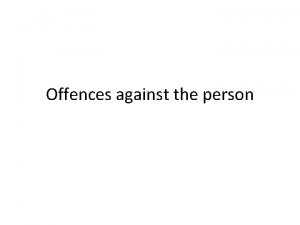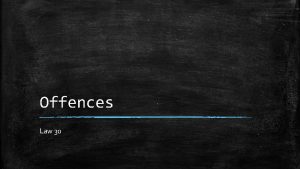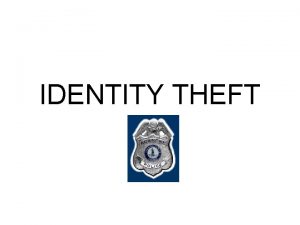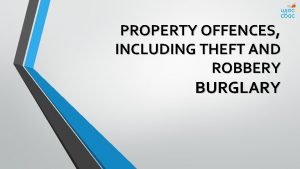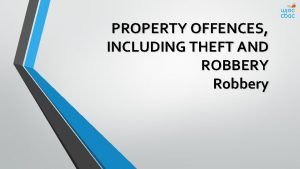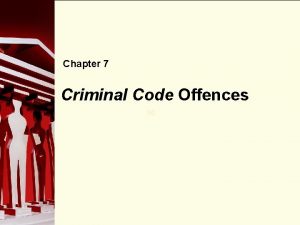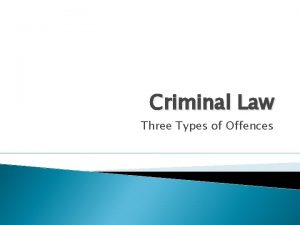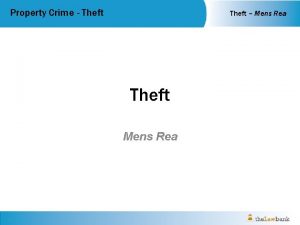Criminal Offences Against Property Theft s 322 1

![Theft [s. 322 (1) ] Theft: taking property permanently or temporarily, without the owner’s Theft [s. 322 (1) ] Theft: taking property permanently or temporarily, without the owner’s](https://slidetodoc.com/presentation_image_h2/2139169da6f3cb726089ced9786b1190/image-2.jpg)















- Slides: 17

Criminal Offences Against Property
![Theft s 322 1 Theft taking property permanently or temporarily without the owners Theft [s. 322 (1) ] Theft: taking property permanently or temporarily, without the owner’s](https://slidetodoc.com/presentation_image_h2/2139169da6f3cb726089ced9786b1190/image-2.jpg)
Theft [s. 322 (1) ] Theft: taking property permanently or temporarily, without the owner’s permission. “Colour of Right”: The honest belief that a person owns or has permission to use an item. Example of borrowing car Sentencing for theft depends on the value of the goods stolen “Theft Over” indictable offence of stealing goods over $5000 - 10 Year max imprisonment “Theft Under” hybrid offence of stealing goods under $5000 - 2 Year max imprisonment

Robbery & Breaking + Entering Robbery: A theft that involves the threat or use of violence Indictable offence; Life Imprisonment Maximum Breaking & Entering: Breaking & Opening something in order to enter the premises w/out permission w/ the intent to commit an indictable offence Indictable Offence: ◦ Max 10 years imprisonment if a commercial dwelling is broken in to ◦ Max life imprisonment if a dwelling house is broken in to

Mischief Wilfully destroying or damaging property or data, interfering with the lawful use of property or data Vandalism – destroying or defacing property Hybrid offences Life in prison Example: Pierre and Matthew were drinking, way home they put tree trunk on train tracks. Next day trained stopped before. Even though no one killed or injured still could be sentenced to life

Public mischief Hybrid offence someone provides false information that either misleads the police in their investigation or tricks them into thinking a crime has been committed when no crime has taken place Example: falsely reporting a stolen car

Fraud - Intentionally deceiving someone in order to cause a loss of property, money, or service The Crown must prove that the accused purposely intended to deceive Falsifying employment records, failing to collect fares, manipulating the stock market Determined by the value of the fraudulent transaction Less then $5000 – summary offence punishable by a fine or indictable offence of 2 years More then $5000 - indictable offence with max of 10 years in prison

Prostitution Refers to the act of engaging in sexual services for money Act of prostitution is not a criminal offence Soliciting (communicating for the purpose of prostitution is illegal) Summary conviction offence Income for prostitution are indictable offences with max penalty of 10 years

Gambling Not a criminal offence but offences can be committed in relation to gambling Disorderly houses (betting or gaming house) and illegal forms of betting Indictable offence = 2 years prison

Drug Offences Anything involving substances listed under “Schedule I, III, IV, V of the Controlled Drug & Substance Act (Examine Chart on Pg. 245)

Possession Having a substance listed under Schedule I, II or III of the Controlled Drugs + Substance Act Possession: the state of having knowledge of & control over something 3 Points to Consider: 1) 2) 3) Person in Possession must know what the item is Person may be found guilty even if they give the item to another person Person may be charged even if they don’t have the substance, but they know someone else did and consented to that person having it

Trafficking: A criminal offence that involves selling, giving, transporting or distributing a controlled substance or an authorization for a controlled substance Crown must prove possession of substance w/ intent to sell. R v. Campbell established that only intent to make an offer to sell was enough to be charged. Substances Type of Offence Maximum Penalty Schedule I or II Indictable Life Imprisonment Schedule III Indictable Summary 10 Years 18 Months Schedule IV Indictable Summary 3 Years 1 Year

Money Laundering Practice of transferring cash or other property to conceal its illegal origin Hybrid offence / 10 years (indictable) / summary $2000 and/or 6 months Crown must prove: ◦ Actus Reus – any use, transfer, or possession of sending or delivering, transporting, transmitting, altering, disposing can be a criminal offence ◦ Mens rea – intention to conceal or convert the money ◦ Subject matter of the offence – committing any act or omission related to an offence

Motor Vehicle Offences (Included in Criminal Code)

Dangerous Operation of a Motor Vehicle (s. 2) Motor vehicle: • defined as any vehicle that is drawn, driven or propelled by any means other than muscle power. • E. g. Cars, snowmobiles, motorcycle, motorboats etc. Actus Reus: Crown must prove lives of others were in danger b/c of the driver’s actions Offence Sentence Causes Death (indictable) Max 14 Years Imprisonment Causes Bodily Harm (indictable) Max 10 Years Imprisonment Hybrid Offence Max 5 Years Imprisonment

Failure to Stop At Scene of Accident S. 252 (2) Actus Reas: Anyone involved in a motor vehicle offense who doesn’t stop to give their name & address or offer assistance Offence Sentence Causes Death Max Life Imprisonment Causes Bodily Harm Max 10 Years Imprisonment Hybrid Offence Max 5 Years Imprisonment

Impaired Driving: Ontario Laws New blood alcohol level was set to 0. 05% for >21 + 0% for <21 Hybrid offence ◦ Impaired driving causing bodily harm is indictable with max penalty of 10 years ◦ If driver kills someone, life in prison 1 st Offence: Suspension of licence of 3 days 2 nd Offence: Suspension of licence for 7 days and the driver will have to attend an alcohol education program. 3 rd Offence: Suspension of licence for 30 days & the motorist will have to complete a remedial alcohol treatment program. ◦ Ignition interlock condition placed on their licence for six months.

Impaired Driving Section 253 (b) : Defines impaired as more than 80 milligrams of alcohol in 100 millilitres of blood Section 254: Gives police right to perform breathalyser Section 255(1): Illegal to drive impaired or to refuse to give a breathalyser Sentences: Vary according to # of times person has been convicted of this offence
 Common offences against animals
Common offences against animals False evidence and offences against public justice
False evidence and offences against public justice Callow v tillstone
Callow v tillstone Jcc v eisenhower
Jcc v eisenhower Fia schedule offences
Fia schedule offences Catamite definition
Catamite definition Objective liability offences
Objective liability offences Evaluation of non fatal offences
Evaluation of non fatal offences Non bailable offences in zambia
Non bailable offences in zambia Cybercrime offences inverness
Cybercrime offences inverness Guyana sexual offences act
Guyana sexual offences act Crime against property
Crime against property Crime against property
Crime against property Fe 322
Fe 322 Cpsc 322
Cpsc 322 Ancient china confucius
Ancient china confucius Allopurinol gador 300 mg
Allopurinol gador 300 mg Cpsc 322
Cpsc 322

